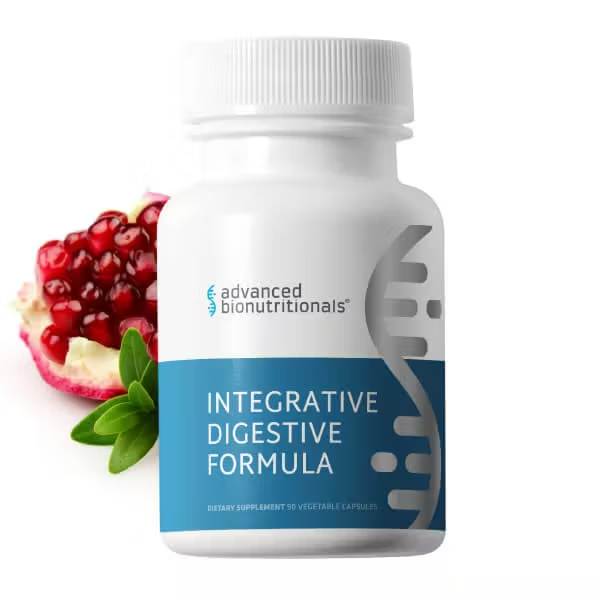The best fermented foods to eat for gut health have been prepared by adding microorganisms, such as bacteria or yeast, to a food source. For example, if you include yeast in sweetened tea, it ferments and becomes kombucha. Similarly, bacteria react with milk to make yogurt. Although people initially used this old practice for its protective benefits, eating fermented foods has now established a new trend due to their claimed health benefits.
Advanced Bionutritional Integrative Digestive Formula

This Chinese Remedy Actually Repairs Your Digestion
- If you’re reading this right now, chances are you’ve tried everything to solve your chronic digestive problems. Perhaps you’ve used probiotics, enzymes, and other natural therapies. Maybe you’ve even resorted to antacids, laxatives, and some of the other usual treatments.
- Yet you may still suffer from digestive nightmares like heartburn, acid reflux, indigestion, gas, bloating, constipation, or diarrhea. That’s true even if you steer clear of “problem” foods you used to enjoy, like dairy products, spicy dishes, and pizza.
- For some people, no matter what they do, they still can’t splurge and eat a cheeseburger or ice cream without paying the price later. They burp constantly, feel gassy, and are too bloated to fit into their clothes. And no matter what they do, they are still constipated.
- But there’s good news. If you have digestive issues, there’s an ancient Chinese remedy that’s been used to successfully treat stomach and bowel problems for thousands of years. It works amazingly well since it corrects an underlying condition that’s causing this misery in the first place.
Several of the best fermented foods to eat for gut health, like kefir, kombucha, and fermented vegetables, include probiotics, which are living microbes that can move to your digestive and immune systems. However, not all foods contain live probiotics; therefore, it is essential to choose a suitable option. These foods can improve the digestive system, support a well-defined gut microbiome, and even aid in reducing the risk of chronic diseases like type 2 diabetes and cardiovascular disease.
What are the Best Fermented Foods to Eat for Gut Health?
Not all fermented foods are beneficial in the same way, as they vary depending on their probiotic substance and nutritional value. However, some are useful for their capability to support the digestive system and overall well-being. Below are nine of the best fermented foods to eat for gut health, recognized for their rich probiotic properties and positive impact on the gut microbiome:
Kefir
Kefir is known as one of the best fermented foods to eat for gut health because of its wide range of probiotics and valuable microbes. Beginning from the Caucasus area thousands of years ago, this bitter, lightly carbonated drink is prepared by fermenting milk with kefir grains over 10 to 24 hours. You can love kefir on its own or use it as a replacement for milk or buttermilk in recipes for a tasty change.
According to the scientific studies, kefir can help to support the blood sugar levels of type 2 diabetes, foster digestive health, help in weight management, and reduce inflammation; however, further research is required to verify these results. Beyond probiotics, kefir is packed with essential nutrients, including vitamins A, B, C, and K in addition to Calcium, Magnesium, and Phosphorus, all of which are valuable and gut-friendly nutrients to any diet.
Kimchi
Kimchi is also considered one of the best fermented foods to eat for gut health due to its potential probiotic properties and nutrient-dense ingredients. This is a common Korean dish that has been made from fermented vegetables such as cabbage, radishes, and leeks; it has been an essential in Korean food for almost a thousand years. The fermentation process not only boosts its taste and spicy flavor but also improves its health benefits.
The probiotics of Kimchi may help to improve the digestive system, reduce bloating, and help to a healthy gut microbiome. Further, studies suggest that it may help to lower cholesterol, manage blood sugar levels, and even stimulate brain and skin health. Kimchi is a great source of fiber, vitamins A and C, and minerals like calcium and magnesium. Kimchi is a tasty and nutritious source to help your digestive system and overall well-being.
Kombucha
Kombucha – a fermented sweet tea- is frequently added to the best fermented foods to eat for gut health because of its rich probiotic properties and great health benefits. Beginning from Northeast China over 2,000 years ago, it is prepared by fermented sweet tea with a SCOBY – a symbiotic culture of bacteria and yeast, and is recognized for its lightly carbonated bitter flavor.
According to some studies, in animals, kombucha can help a more diverse gut microbiome, decrease inflammation, and even help to improve cardiovascular health, cholesterol, and blood sugar levels. Yet, evidence in humans is still incomplete, and accurate elements in kombucha may exacerbate gastrointestinal problems like irritable bowel conditions in some individuals. As with other fermented foods, it is essential to select versions with low added sugar and artificial flavor to accurately gain the gut health benefits.
Sauerkraut
Sauerkraut is also known as one of the best fermented foods to eat for gut health because of its rich nutrient probiotic properties. It is made with cabbage; its bitter and crunchy taste not only helps a healthy digestive system but also helps to reduce the symptoms of irritable bowel syndrome (IBS), which has been verified in different studies. It’s useful that microbes can help in balancing gut bacteria and may even support lower cholesterol levels, as revealed in animal research.
Beyond probiotics, sauerkraut is a great source of fiber, vitamin C and B6, and iron, which makes it a nutrient-rich addition to your daily diet. You can add it to sandwiches, meats, or on its own for a simple and tangy way to boost gut health.
Yogurt
Yogurt is widely studied as one of the best fermented foods to eat for gut health, offering a rich source of probiotics, especially Lactobacillus acidophilus, which helps maintain a natural balance of gut bacteria. Yogurt has been consumed for thousands of years, and it remains a healthy and nutritious food that can be appreciated on its own or added to snacks, sauces, and more.
Studies show that the regular consumption of yogurt has numerous health benefits, including improved digestive health, enhanced cardiovascular health, increased bone strength, and a reduced risk of various chronic diseases, such as type 2 diabetes and certain cancers. To get the maximum health benefits, choose plain yogurt with “live and active cultures” that is free from added sugar. Besides probiotics, yogurt provides top-quality protein, calcium, phosphorus, and vitamin B complex, making it a powerful addition to a balanced diet.
Miso
Miso is thought to have begun in China before making its way to Japan sometime in the 7th century. Miso is prepared by adding soybeans, fermented rice, and salt, then allowing the blend to ferment for some months. Miso has a rich, salty flavor and can be used in soups, sauces, and salad dressings along with other dishes. According to some evidence, miso provides several health benefits, such as balanced blood sugar levels, decreased risk of cancer and heart problems, and improved gut health. Due to probiotic properties and digestive support, miso is often considered one of the best fermented foods to eat for gut health, which makes it a remarkable addition to a balanced diet.
Cheeses
Cheese is thought to have developed about 4000 years ago, when a merchant left a sheep-stomach pocket filled with milk in the Arabian sun, leading to natural fermentation. At present, most cheeses undergo a fermentation process, with varieties like aged cheddar, Parmesan, Swiss, and some kinds of cottage cheese, including useful probiotics.
These fermented cheeses are not only tasty but can also help gut health and maintain healthy cholesterol levels. A great source of calcium, cheese can support bone health; however, it is often high in sodium and marinated fat. As such, it is better to enjoy in restraint and as part of a balanced diet. It is rich with probiotic properties; fermented cheese deserves a proper place among the best fermented foods to eat for gut health.
Sourdough Bread
Sourdough bread, believed to have originated in ancient Egypt, is often distinguished by its exceptional taste and potential digestive benefits. Formulated using a fermented meze of flour, water, and salt, sourdough depends on natural wild yeast and bacteria to leaven the dough. Although the probiotics in the starter don’t survive the baking process, the finished bread still holds prebiotics, which may support a healthy gut microbiome.
This makes sourdough a tangy addition to a diet designed for gut health. Additionally, it is often contained in debates about the best fermented foods to eat for gut health, while it is important to understand that not all store-bought sourdough is genuinely fermented. For those with sufficient gluten intolerance, established sourdough may be easier to digest, but it remains inappropriate for individuals with celiac disease.
Apple Cider Vinegar
Apple cider vinegar has a significant history dating back 7000 years, first time it was consumed by the Babylonians for food preservation and then by Hippocrates in ancient Greece as a remedy for the common cold. Prepared with fermented apple juice with yeast and bacteria, apple cider vinegar produces a tasty flavor that is an adjustable ingredient in salad dressings, baking, pickling, and soups.
Once raw, it included live bacteria, some of which may have probiotic elements that support gut health. Due to its strong effects for maintaining blood sugar and cholesterol levels, it is frequently added in debates as the best fermented food to eat for gut health. Adding it to your routine diet in balance can be a simple and tangy way to promote digestive health.
How to Add Fermented Food to a Daily Diet?
Including the best fermented foods to eat for gut health in your daily diet can be a great way to support digestive health along with overall well-being. The experts advised that you must start with a small amount of different kinds of foods to avoid bloating, then gradually increase your consumption over time.
Fermented foods are packed with probiotics, which can support a balanced gut microbiome and improve digestive function. But it is necessary to understand that fermented foods are the only element of a healthy eating pattern. For better and improved results, combine the best fermented foods to eat for gut health with a balanced diet containing plenty of fruits, vegetables, whole grains, and healthy fats, ensuring you meet your nutritional requirements while supporting a healthy gut.
Conclusion
Fermented foods are available in different varieties, but they all have a single common benefit: they are made by introducing beneficial microbes to their raw ingredients. Fermented foods are rich in probiotics – live bacteria that support the gut. Regular use of the best fermented foods to eat for gut health can beneficial effect on your digestive system. However, it is important to understand that not all fermented foods have live probiotics, so it is essential to pick those foods that particularly provide these benefits. By adding the right fermented foods and avoiding additional sugar, you can boost the substantial benefits for your gut health and overall well-being.






